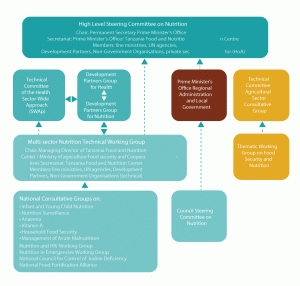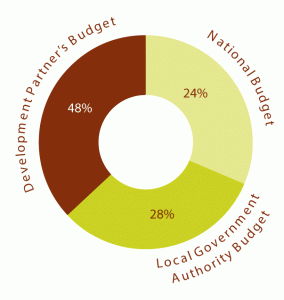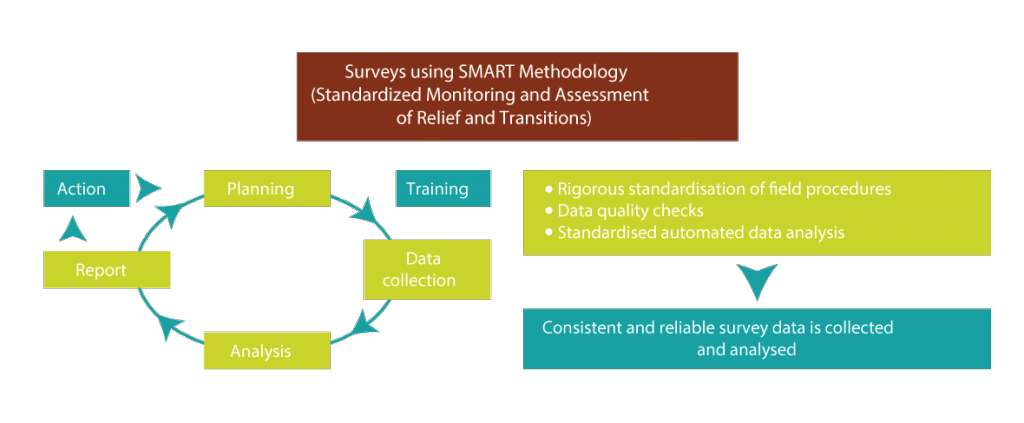Data Driven Programming
In 2011, the Government of the United Republic of Tanzania and its UN partners (WHO, UNICEF, UNREACH, and WFP) donor partners (USAID, Irish AID, DFID,
DANIDA, CIDA, Micronutrient Initiative, World Bank and Children’s Investment Fund Foundation) and non-government organisations under the umbrella of The Partnership for Nutrition in Tanzania
[vc_row row_type=”row” text_align=”left” css_animation=””][vc_column width=”1/2″]

Dr. Joyceline Kaganda
Acting Managing Director, Tanzania Food and Nutrition Centre[/vc_column_text][/vc_column][/vc_row][vc_row row_type=”row” text_align=”left” css_animation=””][vc_column][vc_separator type=”transparent”][/vc_column][/vc_row][vc_row row_type=”row” text_align=”left” css_animation=””][vc_column][vc_column_text custom_options=””]
Background
In 2011, the Government of the United Republic of Tanzania and its UN partners (WHO, UNICEF, UNREACH, and WFP) donor partners (USAID, Irish AID, DFID, DANIDA, CIDA, Micronutrient Initiative, World Bank and Children’s Investment Fund Foundation) and non-government organisations under the umbrella of The Partnership for Nutrition in Tanzania (PANITA see Fig.1), developed the National Nutrition Strategy (NNS). The strategy contains eight priority areas and has a substantial focus on research, monitoring and evaluation, as they are essential to evidence-based decision-making and enhancing accountability.
Although the importance of research in facilitating effective decision-making is widely acknowledged, this recognition has not yet translated into ample investment including the allocation of budgets to research. After three years of implementing the NNS, over 80% of the budget has been used for nutrition services and capacity building. At all levels, much of the work carried out to improve nutrition is consultative. Forty-eight percent of the total budget has come from development partners that have a limited focus on research itself (Public Expenditure Review, 2014) (see Fig.2). It therefore begs a question as to whether decision-makers fully comprehend the essence of research activities to inform decision-making.[/vc_column_text][/vc_column][/vc_row][vc_row row_type=”row” text_align=”left” css_animation=””][vc_column][vc_separator type=”transparent”][/vc_column][/vc_row][vc_row row_type=”row” text_align=”left” css_animation=””][vc_column][vc_column_text custom_options=””]
Engagement
The Commission for Science and Technology (COSTECH) is the primary coordinator of research activities in Tanzania. The COSTECH is a parastatal organisation responsible for co-coordinating and promoting research and technology development activities in the country. It is the chief advisor to the Government on all matters relating to science and technology and their application to the socio-economic development of the country. Established by Act of Parliament No. 7 of 1986 as a successor to the Tanzania National Scientific Research Council, COSTECH became operational in 1988. The Act provides for a structural framework of the Commission, which brings together the top leadership of the scientific and technological institutions in the country in one forum.
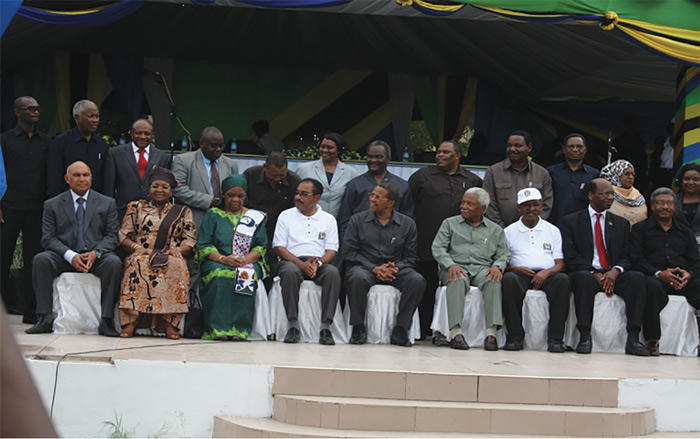
In some cases, however, nutrition research is coordinated and undertaken by the Ministry of Health and Social Welfare (MoHSW) through the Tanzania Food and Nutrition Centre (TFNC) and various other institutions and organisations, which are not directly linked to either COSTECH or TFNC. These include universities, research institutions and NGOs.
The relationship between academia and policymakers has improved markedly over the past few years. Most notable has been the involvement of various distinguished academics in some of the key policymaking bodies. Several members of academia from the Sokoine University of Agriculture also serve in decision-making bodies such as the Ministry of Agriculture/Livestock Development, Ministry of Industries, Tanzania Bureau Standards (TBS), Ministry of Education and Ministry of Natural Resources/Forestry, among others. It has also become increasingly common for policymakers and academia to meet at various fora where research findings are shared, analysed and discussed. These include the technical coordination meetings for major nutrition problems in Tanzania, such as control of Vitamin A deficiency, Infant and Young Child Nutrition, Social and Behaviour Change Communication, Food Fortification Alliance and review meetings for the health and nutrition sector.
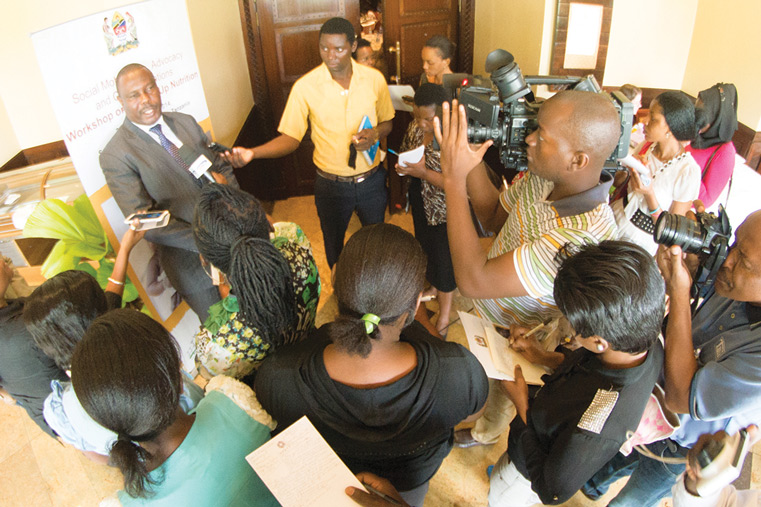 [/vc_column_text][/vc_column][/vc_row][vc_row row_type=”row” text_align=”left” css_animation=””][vc_column][vc_separator type=”transparent”][/vc_column][/vc_row][vc_row row_type=”row” text_align=”left” css_animation=””][vc_column]
[/vc_column_text][/vc_column][/vc_row][vc_row row_type=”row” text_align=”left” css_animation=””][vc_column][vc_separator type=”transparent”][/vc_column][/vc_row][vc_row row_type=”row” text_align=”left” css_animation=””][vc_column]
Examples
- Landscape analysis of Tanzania’s readiness to accelerate action in nutrition (2012) by TFNC, with the support of WHO. The analysis identified gaps, constraints and opportunities for scaling up nutrition interventions and in doing so facilitated an analysis of existing capacities and resources. From these studies, guidelines were developed or reviewed, on specific issues, such as Infant and Young Child Feeding, HIV, International Code of Marketing of Breast-milk Substitutes, Vitamin A and cassava processing. Development of planning and budgeting guidelines, and strategies and standards for food fortification were also prioritised.
- Nutrition institutional capacity assessment (2011). This looked at the nutrition institutions from structure to services to identify gaps for better implementation of nutrition services across Tanzania. The results helped accelerate the deployment of nutrition officers nationwide and strengthen coordination mechanisms.
- An assessment of capacity needs of nutrition focal points and nutrition officers. From this assessment, skill-based modules were developed and are currently being used. These modules include: i) The nutrition situation in Tanzania, ii) Integrating the National Nutrition strategy into district plans, budgeting and procurement, iii) Monitoring of the nutrition situation, and iv) Resource mobilisation, advocacy and capacity building skills.
- The Public Expenditure Review for nutrition (2014) including a policy brief were used to advocate for increasing resource allocation at both the national and local government levels.
- The NNS is conducted using the SMART Methodology (see Fig.3). Results revealed that national average of stunting rates declined from 42% to 35%.
- Micronutrient biomarkers surveys were conducted in 2010 as part of the Demographic Health Survey. Data from these surveys accelerated the formation of the food fortification alliance and the development of policy guidelines for micronutrient fortification in the country.
- Assessments of food security at the household level, including cassava added value addition project development of universal salt iodisation regulations to address the prevalence of goiter determined from surveys conducted in the 1980s.
- Recent evidence gathered on aflatoxin contamination in major grain reserves found that a potentially toxigenic species of fungi was present in significant quantities in stored maize grains. These results stimulated the formation of the National Steering Committee for Control of Mycotoxin in the country, which is continuing the research in assessing the mycotoxin levels of other staple foods.
- Preparation of children’s foods using germination and fermentation technologies were promoted using studies conducted in the 1980s based on the factors contributing to growth faltering in weaning aged children.
[/vc_column_text][/vc_column][vc_column width=”1/2″]
Key Lessons
- High-level political commitment is key to enhancing action for improved nutrition for all
- Advocacy to ensure leaders commitment to efficient action, multi-sectoral collaboration and effective coordination is essential
- Creating common and clear roles of key sectors, parties and the nation on making nutrition everyone’s responsibility and a call to accountability and good governance in nutrition is also crucial.
Challenges
- There is insufficient local data to inform policies and programs – research studies are scattered across Tanzania and have limited geographic coverage
- There is a lack of institutional capacity for analysing, synthesising and applying research to decision-making, including minimal use of local data for contextualised decisions, poor understanding of policy briefs and lack of sufficient tools to facilitate the analysis
- There is limited opportunities for joint priority-setting among partners
- There is inadequate financial resources to generate policy-relevant evidence
[/vc_column_text][/vc_column_inner][/vc_row_inner][/vc_column][/vc_row][vc_row row_type=”row” text_align=”left” css_animation=””][vc_column][vc_column_text custom_options=””]
What needs to be done to overcome the challenges?
- Strengthening capacity in data collection and analysis, interpreting evidence, data synthesis and identifying gaps in existing research. Develop the capacity of TFNC to undertake operational research and monitoring and evaluation
- Develop tools and channels to facilitate advocacy and the implementation of a system for consolidating and communicating information on nutrition to relevant actors, including the dissemination of research findings
- Link with relevant institutions to improve the quality and evidence-base for planning, budgeting and tracking progres
- Set up a joint forum for setting research priorities and responsibilities amongst stakeholders
- Mobilisation of resources, both financial and technical, for research and advocate for the inclusion of nutrition research in national budgets
- Evaluate the performance of policy makers, including political leaders, using clear concise measurable performance indicators. For example, the inclusion of nutrition improvement in society as an indicator for evaluating the success or failure of a leader at all levels.
[/vc_column_text][/vc_column][/vc_row]
